 W
WAbuse is a run and gun video game developed by Crack dot Com and published by Electronic Arts in North America and Origin Systems in Europe. It was released on February 29, 1996 for MS-DOS. A Mac OS port of the game was published by Bungie and released on March 5, 1997. The game's source code, along with some of the shareware content, has been in the public domain since the late 1990s and has been ported to Linux and many other platforms.
 W
WAxis & Allies is a 1998 computer wargame closely based on the Axis and Allies: Classic board game.
 W
WBalls of Steel is a pinball computer game developed by Wildfire Studios and released on September 3, 1997. It is the only game to be published under the Pinball Wizards label, a division of Apogee Software.
 W
WBio Menace is a 1993 game developed and published by Apogee Software for MS-DOS. A 2D multidirectional scrolling platform game, it was built on a licensed version of id Software's Commander Keen game engine. Apart from the engine and music, all in-game content was created by the game's designer, Jim Norwood. In 2014, the game was re-released on Steam, and in 2015 on GOG.com with support for Microsoft Windows, macOS, and Linux.
 W
WBlake Stone: Aliens of Gold is a first-person shooter for DOS created by JAM Productions and published by Apogee Software in 1993. The following year, a sequel called Blake Stone: Planet Strike was released, which continues where Aliens of Gold leaves off. Some copies of the game provided a Command Control Gravis Gamepad.
 W
WBlake Stone: Planet Strike is a first-person shooter video game, the sequel to Blake Stone: Aliens of Gold, made by JAM Productions and released for DOS on October 28, 1994, by Apogee Software.
 W
WCatacomb 3-D is the third in the Catacomb series of video games, and the first of these games to feature 3D computer graphics. The game was originally published by Softdisk under the Gamer's Edge label, and is a first-person shooter with a dark fantasy setting. The player takes control of the high wizard Petton Everhail, descending into the catacombs of the Towne Cemetery to defeat the evil lich Nemesis and rescue his friend Grelminar.
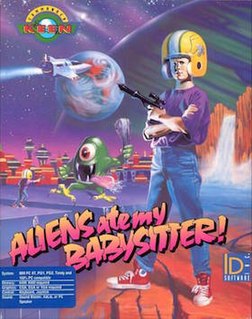 W
WCommander Keen in Aliens Ate My Babysitter is a side-scrolling platform video game developed by id Software and published by FormGen in December 1991 for DOS. It is the seventh episode of the Commander Keen series, though it is numbered as the sixth, as Commander Keen in Keen Dreams is outside of the main continuity. The game follows the titular Commander Keen, an eight-year-old child genius, as he journeys through an alien world to rescue his kidnapped babysitter. The game feature Keen running, jumping, and shooting through various levels while opposed by aliens, robots, and other hazards.
 W
WCommander Keen in Goodbye, Galaxy is a two-part episodic side-scrolling platform video game developed by id Software and published by Apogee Software in 1991 for DOS. It consists of the fifth and sixth episodes of the Commander Keen series, though they are numbered as the fourth and fifth, as Commander Keen in Keen Dreams is not part of the main continuity. The game follows the titular Commander Keen, an eight-year-old child genius, as he first journeys through the Shadowlands to rescue the Gnosticenes so they may ask the Oracle how the Shikadi plan to destroy the galaxy, and then through the Shikadi's Armageddon Machine to stop them. The two episodes feature Keen running, jumping, and shooting through various levels while opposed by aliens, robots, and other hazards.
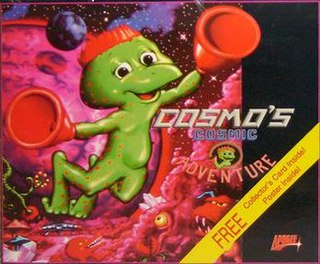 W
WCosmo's Cosmic Adventure: Forbidden Planet is a video game programmed by Todd Replogle and published by Apogee Software. It is a two-dimensional side-scrolling platform game. The game was released in mid March 1992 for MS-DOS compatible systems.
 W
WDemonStar is a shareware video game developed by Mountain King Studios, based on their earlier game Raptor: Call of the Shadows. It is a top-down vertically scrolling shooter with an outer space theme. The game shares many similarities with the Raiden series. DemonStar features various power-ups, including smart bombs and other power-ups which modify the types of projectiles that the player's ship fires. The full version of the game has 18 levels, each with a boss ship at the end.
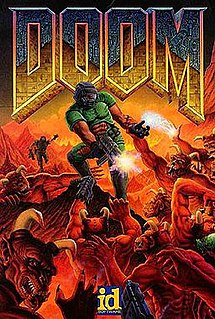 W
WDoom is a 1993 first-person shooter (FPS) game developed by id Software for MS-DOS. Players assume the role of a space marine, popularly known as Doomguy, fighting his way through hordes of invading demons from Hell. The first episode, comprising nine levels, was distributed freely as shareware and played by an estimated 15–20 million people within two years; the full game, with two further episodes, was sold via mail order. An updated version with an additional episode and more difficult levels, The Ultimate Doom, was released in 1995 and sold at retail.
 W
WDoom II, also known as Doom II: Hell on Earth, is a first-person shooter game by id Software. It was released for MS-DOS computers in 1994 and Macintosh computers in 1995. Unlike the original Doom, which was initially only available through shareware and mail order, Doom II was sold in stores.
 W
WDuke Nukem 3D is a first-person shooter video game developed by 3D Realms. It is a sequel to the platform games Duke Nukem and Duke Nukem II, published by 3D Realms.
 W
WDuke Nukem II is a 1993 platform game developed and published by Apogee Software. The game consists of four episodes, the first available as shareware. It is the follow-up to 1991's Duke Nukem, and followed by Duke Nukem 3D in 1996. Todd Replogle was the primary designer of all three games.
 W
WMajor Stryker is a 2D vertical scrolling shooter game written for DOS by Apogee Software. Its working title was "Strike Force" and was released in January 1993. It consists of three episodes, with the first episode distributed as shareware, and the rest available commercially. The three episodes are set on a Lava Planet, an Arctic Planet and a Desert Planet. The game was re-released as freeware on March 14, 2006, and on Steam with support for Microsoft Windows and macOS in 2014.
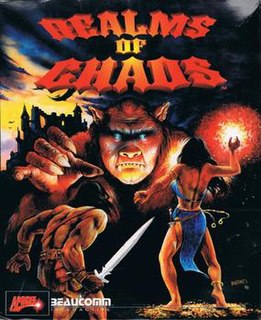 W
WRealms of Chaos is a platform game written for DOS, published by Apogee Software as shareware. The game was authored by Keith Schuler, who had previously designed Paganitzu, and was originally to be a sequel entitled Alabama Smith and the Bloodfire Pendant. It is still sold by Apogee. Like previous platform Apogee games, this one utilized the FAST engine. The game was re-released in 2013 on GOG.com with support for Windows, macOS, and Linux.
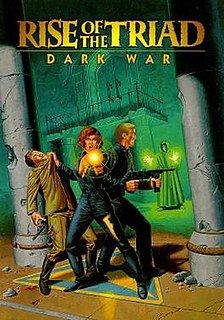 W
WRise of the Triad: Dark War is a first-person shooter video game, developed and published by Apogee Software in 1995. The player can choose one of five different characters to play as, each bearing unique attributes such as height, speed, and endurance. Its remake was designed by Interceptor Entertainment and released by Apogee Games in 2013. The shareware version of the game is titled, Rise of the Triad: The HUNT Begins.
 W
WWolfenstein 3D is a first-person shooter video game developed by id Software and published by Apogee Software and FormGen. Originally released on May 5, 1992 for DOS, it was inspired by the 1981 Muse Software video game Castle Wolfenstein, and is the third installment in the Wolfenstein series. In Wolfenstein 3D, the player assumes the role of Allied spy William "B.J." Blazkowicz during World War II as he escapes from the Nazi German prison Castle Wolfenstein and carries out a series of crucial missions against the Nazis. The player traverses each of the game's levels to find an elevator to the next level or kill a final boss, fighting Nazi soldiers, dogs, and other enemies with knives and a variety of guns.
 W
WXenophage: Alien Bloodsport is a fighting game written for MS-DOS, by Apogee Software. It was originally released as shareware in 1995. The game was best known for calling all its fatalities "Meat", with the announcer yelling "Meat" after every fatality was performed and Barney The Dinosaur being a playable character.